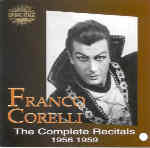Franco Corelli had it all–film star looks, stage presence, and a powerful, penetrating spinto tenor that ranged from a dark, almost baritonal quality in the lower registers to gleaming, golden high notes. Listening to this compilation of what are purported to be his “complete recitals 1956-1959” and reveling in the sheer electricity of his singing, it’s easy to understand why he was revered even in an era rich in outstanding tenors and why he would be undisputed king of the hill in today’s era largely bereft of voices adequate to the spinto repertoire. He thrills even in roles for which lighter voices are better suited, for the passion of Corelli’s Pollione in Norma and his ringing high note at the end of “Meco all’altar di Venere” sweep such considerations away. He’s a stylish Verdian, as his vibrant voice and apt phrasing in Un Ballo’s “Ma se m’è forza Perderti” immediately declare. He’s lachrymose in “Ah, si ben mio” from Trovatore, and the cabaletta “Di quella pira” really rocks. There have been far more elegant Dukes in Rigoletto, but none more exciting in “La donna è mobile”, even with roughly executed diminuendos coming off loud high notes, a stylistic tic better executed and often heard throughout these discs. Throw in a heroic yet tender “Celeste Aida” and an overwhelmingly powerful “Esultate!” from Otello, among other Verdi gems here, and it’s hard to resist jumping on the Corelli bandwagon.
With his propensity for loud, extended high notes and dramatic involvement, Corelli was a natural for the verismo repertoire of which this set offers numerous compelling examples, such as Cavaradossi’s “E lucevan le stele” from Tosca. He could sob with the best of them too (another asset in verismo) as we hear in “Vedi, io piango” from Giordano’s Fedora, along with an even more weepy ending to “Or son sei mesi” from Puccini’s La fanciulla del West, and the mother of all tears in the aria from Mascagni’s Lodoletta. Two arias from Giordano’s Andrea Chénier and another pair from Leoncavallo’s Pagliacci, of course including “Vesti la giubba”, confirm him as the ideal verismo belter.
Corelli often appeared in Romantic French operas, where his verismo approach can make you pine for traditional French elegance and ease. But whatever considered judgement declares after the fact, while listening to him pour out his glorious tones, such considerations are happily shelved. Thus, in Don José’s “Flower Song” in Carmen, Corelli’s muscular timbre, trademark diminuendo, and interpretive earnestness are compelling even though they’re not fully convincing. Voice and style are in similarly uncomfortable symbiosis in Massenet’s “Ah!, non mi ridestar” from Werther.
The CD “booklet” defines the phrase “bare-bones”; all we get are track listings. No timings, no indication of where and when recordings were made or released, no mention of supporting singers, conductors, or orchestras. This is all the more aggravating because the presence of a chorus before Otello’s “Esultate!” makes you wonder about the provenance, and the track indicated as being the Trovatore “Ah, si, ben mio” actually is the entire scene including Ruiz’s entry and “Di quella pira”. The remastered sound brings the voice front and center, relegates the orchestra to the dim background, and is excessively bright at times, including the electronic hash that disfigures parts of “Amor ti vita” from Giordano’s Fedora.
































